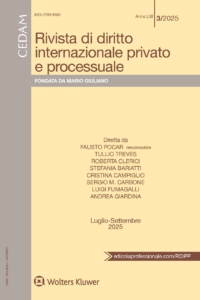Views
CJEU, Case C-540/24, Cabris Investment: Jurisdiction Clause in Favour of EU Court is Subject to Art. 25 Brussels Ia even if both Parties are Domiciled in the Same Third State
By Salih Okur, University of Augsburg
On 9 October 2025, the CJEU, in Case C-540/24 (Cabris Investment), had to decide whether Art. 25 Brussels Ia applies to “an agreement conferring jurisdiction in which the contracting parties, who are domiciled in the United Kingdom and therefore (now) in a third State, agree that the courts of a Member State of the European Union are to have jurisdiction over disputes arising under that contract, falls within the scope of that provision, even if the underlying contract has no further connection with that Member State chosen as the place of jurisdiction.“
Unsurprisingly, the Court held that it does.
Pre-print article on SSRN on “Mirin” and the Future of Cross-Border Gender Recognition
I recently published the pre-print version of an article on SSRN that was accepted by the International Journal of Law, Policy and the Family. The article is called ““Mirin” and Beyond: Gender Identity and Private International Law in the EU“. The article is part of a special issue dealing with questions of gender identity that (probably) will come out at the beginning of 2026.
As it deals with matters of private international law (regarding gender identity) and the CJEU decision “Mirin”, I thought it might be interesting for the readers of this blog to get a short summary of the article. If it sparks your interest, of course, I would be glad if you consider reading the whole text – and to receive feedback and further thoughts on this topic. 🙂
Draft General Law on Private International Law aims to bring Brazil from the 19th into the 21st century
Guest post by Gustavo Ferraz de Campos Monaco, Full Professor of Private Internacional Law – University of São Paulo
In Brazilian law, the regulation of conflicts of laws is still based on a legislation from 1942, during a dictatorial regime, which explains its inspiration from the Italian fascist regime. The values prevailing in Brazilian society back then were quite different from those we hold today, especially in matters concerning family relationships. At that time, the family unit was viewed as having a single domicile, and questions related to the definition of parenthood were unthinkable outside traditional presumptions.
On at least two occasions over the past 83 years, attempts to draft new regulations were undertaken by leading figures in the field – Haroldo Valladão, Jacob Dolinger, and João Grandino Rodas – but both initiatives failed during the process, without the Plenary of the Legislative Houses having expressed an opinion on the merits of the projects. Read more
News
Inaugural event European Civil Justice Centre
In 2025, the European Civil Justice Centre (ECJC) was established at Erasmus School of Law in Rotterdam. This Centre was set up to facilitate the collaboration of scholars and other stakeholders across Europe and beyond in conducting research and related activities with a view to promoting access to justice. The Centre consolidates extensive work spearheaded by Erasmus School of Law civil justice scholars over the past fifteen years (see www.euciviljustice.eu), benefits in particular from support by the KU Leuven, and builds on collaborations with academics, practitioners and policy-makers around the globe. Read more
Crossroads in Private International Law Webinar with on ‘The Digital Afterlife: Digital succession and private international law’ at the University of Aberdeen
The Centre for Private International Law & Transnational Governance of the University of Aberdeen is continuing its Crossroads in Private International Law webinar series with a talk by Kirsten Henckel (Groningen University) titled ‘The Digital Afterlife: Digital succession and private international law’:
Over the past two decades, our daily lives have become ever more digital. This digitization has fundamentally reshaped the nature of property and inheritance. Digital assets ranging from social media accounts, emails and cloud-based archives to cryptocurrencies, NFTs and digital subscriptions now form an integral part of modern estates. These assets frequently lack clear legal classification and existing laws, largely designed for tangible property, struggle to accommodate their unique characteristics.
This webinar examines the emerging field of digital succession through the lens of private international law, highlighting issues that arise when digital estates span multiple jurisdictions. Key issues include determining jurisdiction and applicable law as well as enforcing rights across borders.
Additional information and the link to register can be found here.
Rivista di diritto internazionale privato e processuale (RDIPP) No 3/2025: Abstracts
 The third issue of 2025 of the Rivista di diritto internazionale privato e processuale (RDIPP, published by CEDAM) will be released shortly. It features:
The third issue of 2025 of the Rivista di diritto internazionale privato e processuale (RDIPP, published by CEDAM) will be released shortly. It features:
Cristina Campiglio, Professor at the University of Pavia, Cittadinanza iure sanguinis e nazionalità: riflessioni internazionalprivatistiche [Citizenship by Birthright and Nationality: Private International Law Reflections; in Italian] Read more



